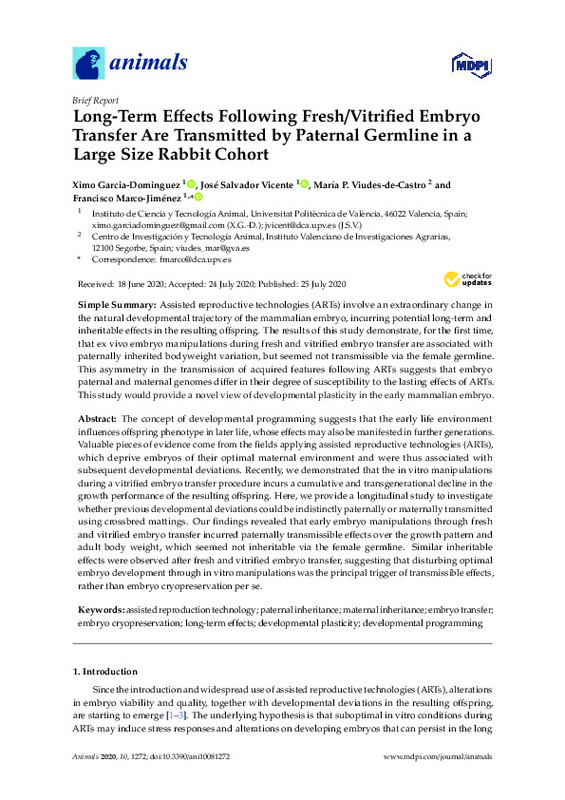JavaScript is disabled for your browser. Some features of this site may not work without it.
Buscar en RiuNet
Listar
Mi cuenta
Estadísticas
Ayuda RiuNet
Admin. UPV
Long-Term Effects Following Fresh/Vitrified Embryo Transfer Are Transmitted by Paternal Germline in a Large Size Rabbit Cohort
Mostrar el registro sencillo del ítem
Ficheros en el ítem
| dc.contributor.author | Garcia-Dominguez, X
|
es_ES |
| dc.contributor.author | Vicente Antón, José Salvador
|
es_ES |
| dc.contributor.author | Viudes-de-Castro, Maria P.
|
es_ES |
| dc.contributor.author | Marco-Jiménez, Francisco
|
es_ES |
| dc.date.accessioned | 2021-11-05T14:06:55Z | |
| dc.date.available | 2021-11-05T14:06:55Z | |
| dc.date.issued | 2020-07-25 | es_ES |
| dc.identifier.uri | http://hdl.handle.net/10251/176262 | |
| dc.description.abstract | [EN] Simple Summary Assisted reproductive technologies (ARTs) involve an extraordinary change in the natural developmental trajectory of the mammalian embryo, incurring potential long-term and inheritable effects in the resulting offspring. The results of this study demonstrate, for the first time, that ex vivo embryo manipulations during fresh and vitrified embryo transfer are associated with paternally inherited bodyweight variation, but seemed not transmissible via the female germline. This asymmetry in the transmission of acquired features following ARTs suggests that embryo paternal and maternal genomes differ in their degree of susceptibility to the lasting effects of ARTs. This study would provide a novel view of developmental plasticity in the early mammalian embryo. The concept of developmental programming suggests that the early life environment influences offspring phenotype in later life, whose effects may also be manifested in further generations. Valuable pieces of evidence come from the fields applying assisted reproductive technologies (ARTs), which deprive embryos of their optimal maternal environment and were thus associated with subsequent developmental deviations. Recently, we demonstrated that the in vitro manipulations during a vitrified embryo transfer procedure incurs a cumulative and transgenerational decline in the growth performance of the resulting offspring. Here, we provide a longitudinal study to investigate whether previous developmental deviations could be indistinctly paternally or maternally transmitted using crossbred mattings. Our findings revealed that early embryo manipulations through fresh and vitrified embryo transfer incurred paternally transmissible effects over the growth pattern and adult body weight, which seemed not inheritable via the female germline. Similar inheritable effects were observed after fresh and vitrified embryo transfer, suggesting that disturbing optimal embryo development through in vitro manipulations was the principal trigger of transmissible effects, rather than embryo cryopreservation per se. | es_ES |
| dc.description.sponsorship | This research was funded by Conselleria d'Educacio, Investigacio, Cultura i Esport (Generalitat Valenciana, Spain), grant number AICO/2019/272. X.G.-D. was supported by a research grant from the Spanish Ministry of Economy, Industry, and Competitiveness, grant number BES-2015-072429. | es_ES |
| dc.language | Inglés | es_ES |
| dc.publisher | MDPI AG | es_ES |
| dc.relation.ispartof | Animals | es_ES |
| dc.rights | Reconocimiento (by) | es_ES |
| dc.subject | Assisted reproduction technology | es_ES |
| dc.subject | Paternal inheritance | es_ES |
| dc.subject | Maternal inheritance | es_ES |
| dc.subject | Embryo transfer | es_ES |
| dc.subject | Embryo cryopreservation | es_ES |
| dc.subject | Long-term effects | es_ES |
| dc.subject | Developmental plasticity | es_ES |
| dc.subject | Developmental programming | es_ES |
| dc.subject.classification | BIOLOGIA ANIMAL | es_ES |
| dc.subject.classification | PRODUCCION ANIMAL | es_ES |
| dc.title | Long-Term Effects Following Fresh/Vitrified Embryo Transfer Are Transmitted by Paternal Germline in a Large Size Rabbit Cohort | es_ES |
| dc.type | Artículo | es_ES |
| dc.identifier.doi | 10.3390/ani10081272 | es_ES |
| dc.relation.projectID | info:eu-repo/grantAgreement/MINECO//BES-2015-072429/ES/BES-2015-072429/ | es_ES |
| dc.relation.projectID | info:eu-repo/grantAgreement/Direcció General de Ciència i Investigació (Generalitat Valenciana)//AICO%2F2019%2F272//Cambios en el genoma y su impacto fenotípico en una línea maternal de conejos tras sucesivas aplicaciones de un programa de crioconservación./ | es_ES |
| dc.rights.accessRights | Abierto | es_ES |
| dc.contributor.affiliation | Universitat Politècnica de València. Departamento de Ciencia Animal - Departament de Ciència Animal | es_ES |
| dc.description.bibliographicCitation | Garcia-Dominguez, X.; Vicente Antón, JS.; Viudes-De-Castro, MP.; Marco-Jiménez, F. (2020). Long-Term Effects Following Fresh/Vitrified Embryo Transfer Are Transmitted by Paternal Germline in a Large Size Rabbit Cohort. Animals. 10(8):1-7. https://doi.org/10.3390/ani10081272 | es_ES |
| dc.description.accrualMethod | S | es_ES |
| dc.relation.publisherversion | https://doi.org/10.3390/ani10081272 | es_ES |
| dc.description.upvformatpinicio | 1 | es_ES |
| dc.description.upvformatpfin | 7 | es_ES |
| dc.type.version | info:eu-repo/semantics/publishedVersion | es_ES |
| dc.description.volume | 10 | es_ES |
| dc.description.issue | 8 | es_ES |
| dc.identifier.eissn | 2076-2615 | es_ES |
| dc.identifier.pmid | 32722445 | es_ES |
| dc.identifier.pmcid | PMC7460406 | es_ES |
| dc.relation.pasarela | S\445380 | es_ES |
| dc.contributor.funder | MINISTERIO DE ECONOMIA Y EMPRESA | es_ES |
| dc.contributor.funder | Direcció General de Ciència i Investigació (Generalitat Valenciana) | es_ES |








